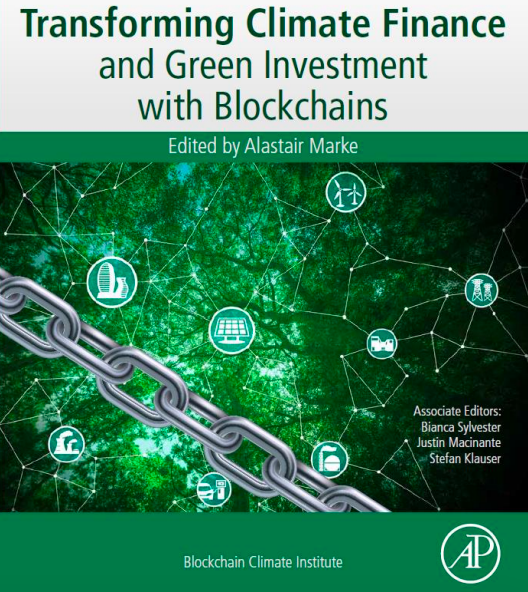02.07.2018
A collaboration of over 40 climate and blockchain experts from more than 20 countries, “Transforming Climate Finance and Green Investment with Blockchains” may be the world’s first book to explore the ways in which this revolutionary ‘trust machine’ can scale and speed up international climate finance flows so important to our planet’s survival.
By issuing this book under the supervision of the sustainability expert Alastair Marke, Blockchain Climate Institute (former International Core Group on Blockchain Climate Finance) aims to raise awareness among stakeholders in the international climate change policy community of the tremendous potential of blockchain technology to considerably enhance climate actions at multiple levels.

Blockchain is already being used in different areas, such as social media, real estate operations, retail, energy trade. It's a distributed ledger technology that records information on multiple different computers at once in a way that ensures both incorruptibility and transparency. It has the potential to revolutionize currency, governments and corporations — and the climate as well, through facilitating renewable energy grids, accelerating international climate finance, and empowering consumers to make climate-conscious decisions. It can cut bureaucracy costs and provide the trust and the necessary level of verification for effective climate investment.
The research aims to fill the gap in understanding this transformative technology and delve into the multiple use cases across the spectrum of climate action. Chapters include blockchain applications in renewable energy smart grids, climate finance transfers, clean technology transfers, carbon markets, the enforcement of green finance regulations and much more.
“Transforming Climate Finance and Green Investment with Blockchains” has been published by Elsevier today, 2 July 2018. It is now available in numerous online bookshops across the world. The electronic version will be available in about 2 weeks. Readers can join a e-forum on LinkedIn readers can ask questions to the authors. It's moderated by Alex Harris, the author of Chapter 2.
DAO IPCI co-founders - Anton Galenovich, Sergey Lonshakov and Alexey Shadrin - wrote a chapter for this book: "Blockchain ecosystem for carbon markets, environmental assets, rights and liabilities: Concept design and implementation".
Blockchain Climate Institute is a non-profit entity combining the functions of a think-and-do tank and an advocacy group. Its executive director is Alastair Marke, a climate finance advisor and an experienced climate change policy researcher. The deputy secretaries of its executive council are Alexey Shadrin, the co-founder of DAO IPCI and Xiaocheng Zhang, the president of Fintech4Good. The Chairman of Advisory Board is Miroslav Polzer, founder and CEO of International Association for the Advancement of Innovative Approaches to Global Challenges (GLOCHA). the Head of Impact Evaluation is Joseph Pallant, the head of Brinkman Climate and Blockchain for Climate initiative.
The Institute works to provide a ‘super connector’ platform among policy-makers, corporate executives and Blockchain innovators for experimenting and adopting the most viable concepts in an enabling environment.
Reviews:
“Blockchains, or more broadly distributed ledger technologies, hold a great potential to spur innovation in a wide range of areas including peer-to-peer renewable energy trading, supply chain management, land titles, and climate finance and investments. “Transforming Climate Finance and Green Investment with Blockchains” can play an important role to raise awareness and to provide in-depth academic insights on these emerging [exponential] technologies and their applications in the context of the urgent response needed to address climate change.” -Alexandre Gellert Paris, United Nations Climate Change Secretariat
“Blockchain technology has significant potential to increase confidence in asset ownership, improve transparency and enhance efficiency and effectiveness in support of the World Bank Group's goal to eradicate extreme poverty. We see interesting applications to accelerate decarbonization and broaden and deepen carbon markets through innovative solutions enabled by blockchain technology. This book is a valuable contribution to a debate which is starting to engage institutions, policy makers and practitioners.” - James Close, Former Director of Climate Change, World Bank
“Digital ledger technologies offer the potential to transform the way we store, exchange, and record economic value and will develop over the same time period as the Sustainable Development Goals. This important book marks an early milestone in our understanding of how blockchain can play a role in confronting climate change, and will remain a key reference for policymakers to understand the potential this transformation will make possible.” - Darius Nassiry, Former Adviser to the Director-General of the Global Green Growth Institute.